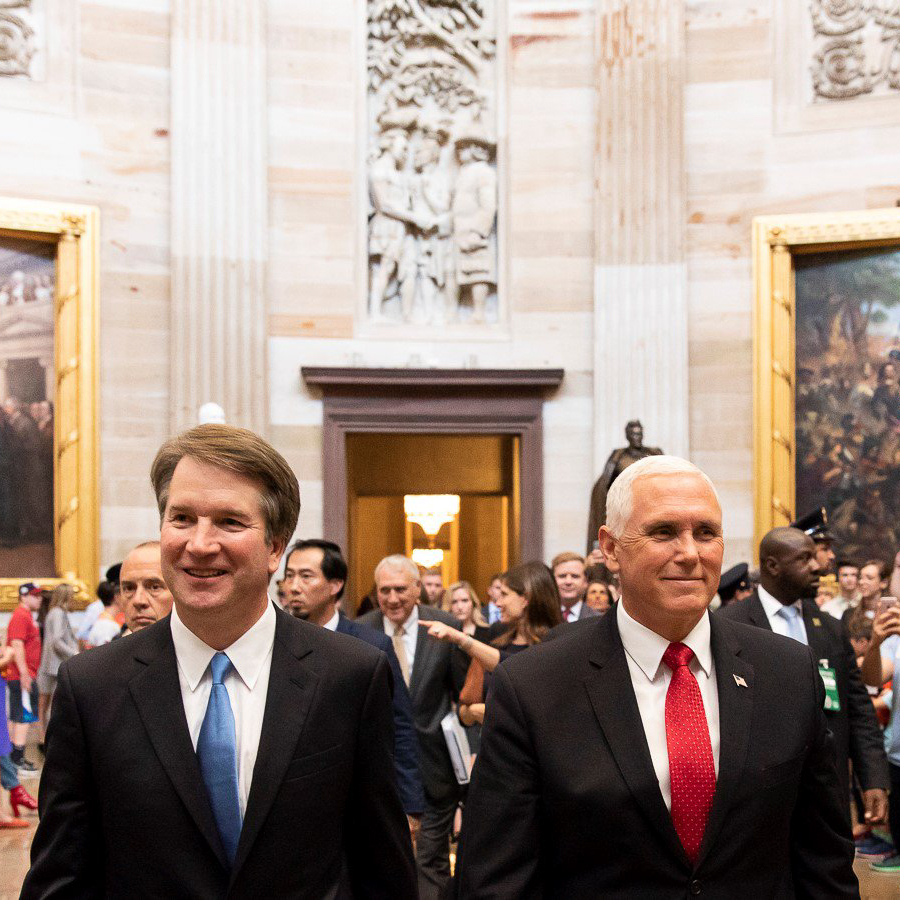
Wikimedia Commons
In the days after a California professor accused Supreme Court nominee Brett Kavanaugh ’87 LAW ’90 of sexual assault, Yale administrators and faculty members who praised the nominee this summer have remained silent amid renewed opposition to his candidacy.
Earlier this summer, Christine Blasey Ford, a professor at Palo Alto University, alleged in a letter that, at a high school party more than 30 years ago, Kavanaugh drunkenly pinned her on a bed, groped her and forced his hands over her mouth. The Intercept first reported the allegations anonymously late last week, and on Sunday, Ford described the incident publicly for the first time in an interview with the Washington Post.
The allegation has led to a new push by Democrats to suspend Kavanaugh’s Senate confirmation vote while the FBI investigates Ford’s accusation. But Senate Republicans have pledged to continue the confirmation process as scheduled.
In July, the Yale Law School issued a press release in which several top faculty members praised Kavanaugh for his government and judicial service, as well as his opinions and mentorship.
In a statement to the News on Sunday evening, Yale Law School spokeswoman Janet Conroy wrote that the July press release was not “an endorsement” of Kavanaugh’s nomination to the Supreme Court.
“As we have said before, Yale Law School is a nonpartisan institution. While individual faculty members may make comments regarding a particular candidate, the law school neither endorses nor opposes candidates for office,” she wrote in her statement to the News. “We routinely have acknowledged high-profile nominations of our alums in this way, including the nomination of Justice Sotomayor.”
Conroy did not comment directly on the new allegations. And she did not respond to an email asking whether the Yale faculty members who praised Kavanaugh stand by their statements or whether the law school would comment on the allegation against its alumnus.
None of the five Yale professors quoted in the release, including Yale Law School Dean Heather Gerken and Sterling Professor Akhil Reed Amar ’80 LAW ’84, responded to requests for comment on Sunday.
Ford told the Post that she was able to escape Kavanaugh when a friend of his jumped on top of them. She said she then fled the house after briefly locking herself in a bathroom.
The sexual misconduct allegations are the first against Kavanaugh. As an undergraduate, he was a member of Delta Kappa Epsilon, the fraternity that came under fire this year over allegations of sexual misconduct. But in Kavanaugh’s time, the fraternity was relatively tame, according to undergraduates who attended the University in the 1980s. He was also a member of Truth and Courage, an all-male club popular among athletes and known to some by the nickname “Tit and Clit.”
The original statement from Yale Law School drew criticism this summer, prompting 909 members of the Yale community to sign an open letter condemning the University for “boasting of its alumnus’s accomplishment.” In a counter petition, 292 other community members defended the Supreme Court nominee, praising the faculty members who spoke highly of Kavanaugh.
On Sunday, Allen Davis GRD ’20, a graduate student in the Astronomy Department, wrote an email to Dean Gerken, urging her to rescind her endorsement of Judge Kavanaugh. In the Yale Law School press release, Gerken wrote that Kavanaugh was “a longtime friend” to many at the law school and that she admired him for his mentorship and teaching.
In the letter, Davis urged Gerken and the law school to speak out publicly against Kavanaugh’s appointment. In 1991, he noted, Anita Hill LAW ’80 testified that then-nominee and current Supreme Court Justice Clarence Thomas LAW ’74 had sexually harassed her.
“I don’t think we want to be known as the school that produced both the sexual harasser and the sexual assaulter on the Supreme Court,” Davis said. “It cheapens the value of a Yale education to have Yale associated with people who have been credibly accused of these types of actions.”
Davis said he viewed the allegation against Kavanaugh as “disqualifying.” Two Republican Senators, Jeff Flake, R-Ariz, and Bob Corker, R-Tenn, have already said the vote should be delayed until the Senate Judiciary Committee hears from Ford.
During Kavanaugh’s confirmation hearings, Yale alumni and professors alike have testified before Congress both for and against the judge. Melissa Murray LAW ’02, a New York University School of Law professor who specializes in constitutional, family and reproductive rights law, called Kavanaugh “a vote against Roe,” referring to the landmark abortion decision Roe v. Wade. In contrast, 10 of his female classmates penned a letter maintaining that Kavanaugh was a respectful and humble friend who treated his classmates as equals.
On the Senate floor, Amar, who teaches a popular constitutional law course at Yale College, argued that Kavanaugh was the best possible option with a Republican president in office. Louisa Garry ’87, a college friend and one of the 10 who penned the letter to the Senate Judiciary Committee, recalled training for the Boston Marathon with the Supreme Court nominee. She added that Kavanaugh raised “strong, independent girls and women with confident voices.”
Kavanaugh graduated from the elite, all-male Georgetown Preparatory School in 1983.
Hailey Fuchs | hailey.fuchs@yale.edu







